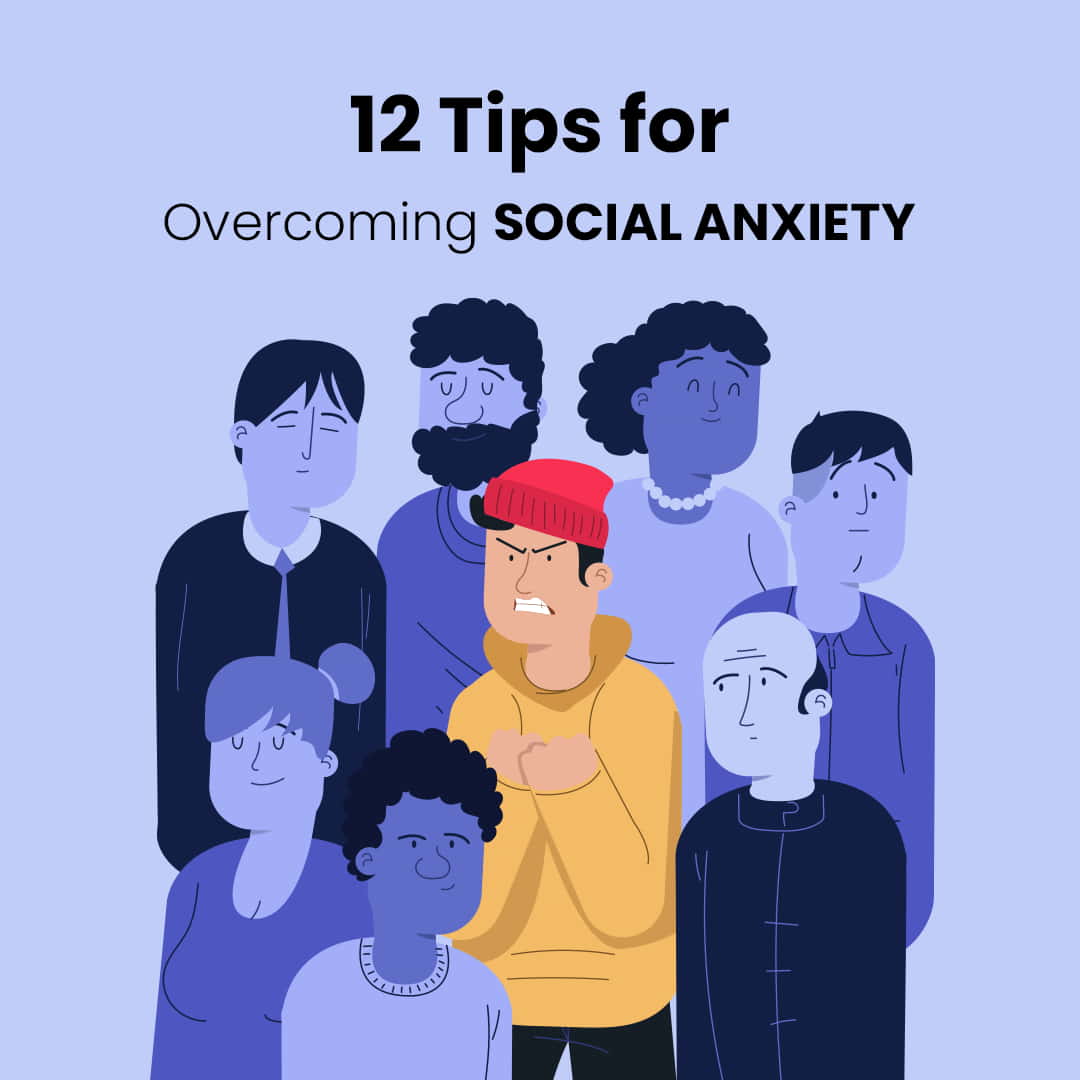Dealing with social anxiety can feel like an impossible challenge. That constant fear of being judged or scrutinized in social situations can make even the most straightforward interactions seem daunting. But here’s the good news: you’re not alone, and there are practical steps you can take to manage and overcome social anxiety.

Recognizing the Symptoms
Before discussing the tips, it’s important to understand what social anxiety looks like. Recognizing the symptoms is the first step toward managing them.
Physical Symptoms
Social anxiety often manifests physically. When facing social situations, you might experience a racing heart, sweating, trembling, or even dizziness. These symptoms are your body’s reaction to what it perceives as a threat.
Emotional Symptoms
Emotionally, social anxiety can lead to intense fear, worry, and self-consciousness. You may excessively worry about upcoming events or feel a strong urge to avoid social interactions altogether.
Tip 1: Understand Your Triggers
One of the most effective ways to manage social anxiety is by understanding what triggers it.
Identifying Common Triggers
Common triggers might include public speaking, meeting new people, or attending social gatherings. Identifying these triggers can help you anticipate and prepare for anxiety-provoking situations.
Keeping a Journal
Keeping a journal can be incredibly helpful. Write down when you feel anxious, what you are doing, and what thoughts are running through your mind. This can help you identify patterns and specific triggers.
Tip 2: Practice Deep Breathing Techniques
Deep breathing is a simple yet powerful tool for calming your mind and body.
Benefits of Deep Breathing
Deep breathing helps reduce the physiological symptoms of anxiety, such as a racing heart and shallow breathing. It can help you feel more grounded and present.
Step-by-Step Guide to Deep Breathing
- Sit or stand comfortably.
- Inhale slowly through your nose for a count of four.
- Hold your breath for a count of four.
- Exhale slowly through your mouth for a count of four.
- Repeat this process several times until you feel more relaxed.
Tip 3: Gradual Exposure to Social Situations
Facing your fears gradually can help desensitize you to anxiety-provoking situations.
The Importance of Gradual Exposure
Gradual exposure involves starting with less intimidating situations and slowly working to more challenging ones. This method helps build confidence and reduce anxiety over time.
Creating a Hierarchy of Social Situations
Create a list of social situations that trigger your anxiety, ranking them from least to most anxiety-inducing. Start with the most straightforward situations and gradually move up the list as you become more comfortable.
Tip 4: Challenge Negative Thoughts
Negative thoughts can fuel social anxiety, but challenging them can help reduce their power.
Recognizing Negative Thought Patterns
Common negative thoughts might include “Everyone is judging me” or “I’ll embarrass myself.” Recognizing these thoughts is the first step to challenging them.
Techniques for Challenging Negative Thoughts
Ask yourself if there’s evidence to support your negative thoughts. Often, these
thoughts are based on irrational fears rather than reality. Replace negative thoughts with more balanced, realistic ones. For instance, instead of thinking, “I’ll make a fool of myself,” try, “I might feel nervous, but I can handle it.”
Tip 5: Focus on Others, Not Yourself
Shifting your focus from yourself to others can significantly reduce social anxiety.
The Benefits of Shifting Focus
When you’re preoccupied with how others perceive you, it amplifies anxiety. Focusing on others can distract you from self-critical thoughts and engage more naturally in conversations.
Practical Ways to Focus on Others
Ask questions, show genuine interest in what others are saying, and actively listen. This will take the spotlight off you and help build meaningful connections.
Tip 6: Improve Your Social Skills
Better social skills can increase confidence and reduce anxiety in social settings.
Importance of Social Skills in Reducing Anxiety
Good social skills can make interactions less daunting. Knowing how to start and maintain conversations can ease anxiety.
Strategies for Building Social Skills
Practice makes perfect. Engage in small talk with strangers, attend social skills workshops, or even role-play scenarios with a trusted friend. The more you practice, the more comfortable you’ll become.
Tip 7: Practice Self-Care
Self-care is crucial for managing anxiety. When you care about your physical and mental well-being, you’re better equipped to handle stress.
Role of Self-Care in Managing Anxiety
Activities that promote relaxation and well-being can help reduce overall anxiety levels. Prioritizing sleep, healthy eating, and regular exercise can make a big difference.
Self-Care Activities to Try
Consider activities such as yoga, meditation, reading, or spending time in nature. Find what works best for you and make it a routine.
Tip 8: Seek Professional Help
Sometimes, managing social anxiety on your own can be challenging. Professional help can provide the support and strategies you need.
When to Consider Professional Help
If social anxiety significantly interferes with your daily life and efforts to manage it on your own, it may be time to seek professional help.
Types of Professional Support Available
Therapists, counselors, and psychologists can offer cognitive-behavioral therapy (CBT), which is highly effective for treating social anxiety. Medications may also be an option for some individuals.
Tip 9: Join Support Groups
Connecting with others who understand what you’re going through can be incredibly beneficial.
Benefits of Support Groups
Support groups provide a safe space to share experiences, offer and receive support, and learn from others with similar challenges.
Finding the Right Support Group for You
Look for local or online support groups specifically for social anxiety. Organizations like the Anxiety and Depression Association of America (ADAA) can help you find a group that fits your needs.
Tip 10: Use Positive Visualization
Visualization can be a powerful tool for reducing anxiety.
Power of Visualization
Imagining yourself successfully navigating social situations can help reduce fear and build confidence. Visualization prepares your mind for real-life scenarios.
How to Practice Positive Visualization
Find a quiet place, close your eyes, and visualize a social situation. Imagine yourself feeling calm and confident, handling the problem successfully. Practice this regularly to reinforce positive outcomes.
Tip 11: Limit Caffeine and Sugar Intake
What you eat and drink can impact your anxiety levels.
How Diet Affects Anxiety
Caffeine and sugar can increase feelings of anxiety and exacerbate physical symptoms like a racing heart. Reducing these can help keep anxiety at bay.
Tips for Reducing Caffeine and Sugar
Gradually reduce your intake of caffeinated drinks and sugary foods. Replace them with healthier options like herbal teas, fruits, and vegetables. Staying hydrated with water is also essential.
Tip 12: Celebrate Small Wins
Recognizing and celebrating your progress, no matter how small can boost your confidence and motivation.
Importance of Celebrating Progress
Celebrating small wins helps reinforce positive behavior and reminds you that you’re making strides to overcome your anxiety.
Ways to Celebrate Your Achievements
Treat yourself to something you enjoy, share your success with a friend, or keep a journal of your accomplishments. Acknowledging your efforts can provide the encouragement you need to keep going.
Conclusion
Overcoming social anxiety is a journey, but with the right strategies and support, it’s entirely possible. By understanding your triggers, practicing self-care, seeking professional help, and gradually facing your fears, you can build confidence and enjoy social interactions without overwhelming anxiety and worry. Progress takes time, so be patient with yourself and celebrate every step forward.
FAQs
What is social anxiety?
Social anxiety is a chronic mental health condition characterized by an intense fear of social situations and being judged or scrutinized by others.
How long does it take to overcome social anxiety?
The time it takes to overcome social anxiety varies for each person. With consistent effort and the right strategies, many people see significant improvement within several months to a year.
Can social anxiety be completely cured?
While social anxiety can be managed effectively, some individuals may always experience a degree of anxiety in social situations. The goal is to reduce its impact on daily life.
What are some quick ways to calm down in a social situation?
Quick ways to calm down include:
- Deep breathing exercises.
- Focusing on your surroundings.
- Grounding techniques like feeling the texture of an object.
How can I help a friend with social anxiety?
Support your friend by being patient, encouraging them to seek professional help, and avoiding pressuring them into social situations that they’re uncomfortable with.

